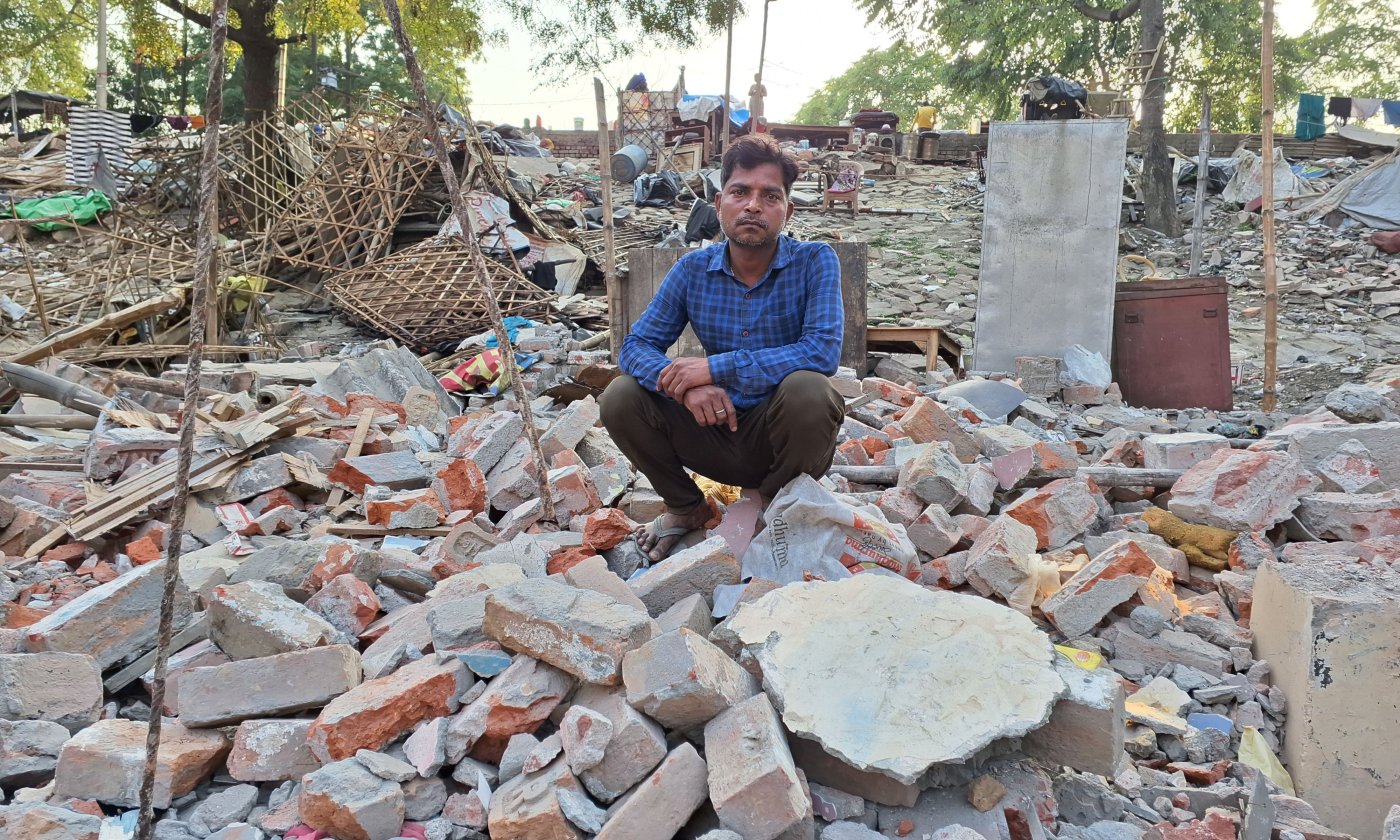Lucknow (Uttar Pradesh): Adjoining the fetid Kukrail Nala or open drain in the heart of Lucknow is Akbar Nagar, a working class settlement home to about 2,000 families.
For several months, residents of Akbar Nagar have lived in fear of losing their homes, as the city’s municipal authorities seek to demolish the settlement for a proposed riverfront project.
On 29 May 2023, Uttar Pradesh chief minister Yogi Adityanath directed officials of several departments and government agencies such as the Lucknow Development Authority, the Nagar Nigam or the municipal body, the department of urban development, the Jal Nigam, and the forest and environment department to prepare a report on the revival of the Kukrail river, which runs 25 km from the Kukrail forest before emptying into the Gomti river, carrying with it waste from the neighbouring residential areas.
Adityanath also instructed the agencies to study “how encroachment can be removed from the catchment area of the river”.
In August 2022, the state government passed a proposal to establish India’s first night safari in Kukrail forest, taking inspiration from Singapore, and to construct a riverfront plaza along the Kukrail Nala, including a jogging track, butterfly park, fishing facilities, rainwater harvesting systems, and a ghat or steps to the river especially for prayers during the annual Chhat Puja festivities.
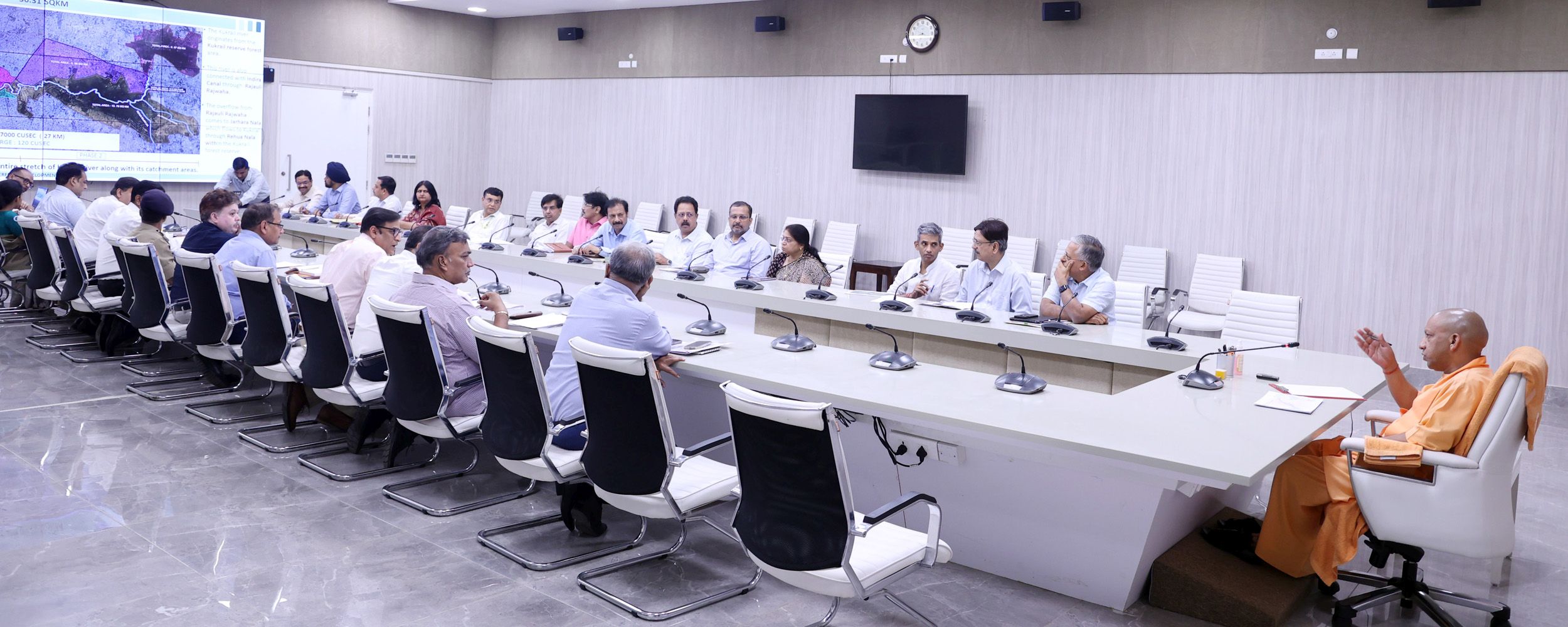
In April 2023, the government of India’s Central Zoo Authority (CZA) gave an in-principle approval to the project for a night safari and wildlife park in Kukrail forest.Once the project kicked off on 1 December 2023, officials began to work on a feasibility study.
On 21 December, the first bulldozer rolled into Akbar Nagar, but before the demolition work could begin, the Allahabad high court’s Lucknow bench ordered a stay.
Ravidas Mehrotra, the Samajwadi Party candidate contesting the Lok Sabha election from the Lucknow constituency against the Bharatiya Janata Party’s Rajnath Singh, alleged that the BJP government had “sold” Akbar Nagar to a private player.
“Akbar Nagar is a very old basti (settlement) where families have resided for 50 years to 75 years,” Mehrotra told Article 14. He said the government could have located the road for which the houses are to be demolished elsewhere.
“A riverfront project should be built near a river, not a sewer,” said Mehrotra.
He said most of Lucknow city stands on nazul land, usually owned by the state government’s revenue department and on which people with long tenures typically received ownership rights.
“The BJP government, however, doesn't want to give this right to the Akbar Nagar residents,” said Mehrotra.
India has recorded a sharp rise in forced evictions in recent years, with the ruling Bharatiya Janata Party (BJP) leading in the use of bulldozers to demolish properties, particularly of Muslims, on charges of being “encroachers” or alleged rioters.
Whether a 45-year-old tea garden plundered for a new airport in Assam or farms in 17 villages razed in Karnataka for a residential project or about a 100 Muslim-owned homes marked for demolition for a rail project in Mathura, those evicted have protested, mostly in vain, the lack of due process and proper compensation or rehabilitation for those ousted from properties built and nurtured over decades.
A ‘National Eviction and Displacement Observatory’ established by the Housing and Land Rights Network in 2015 said in its 2022-23 report that more than 153,000 homes and 738,000 people had been forcefully evicted from their homes in only two years.
In 2022, at least 129 houses were destroyed daily, and 25 people evicted every hour while in 2023, at least 294 houses were destroyed daily, and 58 people evicted every hour, according to the report. Nearly 59% of these people were evicted under the guise of encroachment-removal or beautification drives.
“These alarming figures are a conservative estimate, as they only reflect cases documented by HLRN through primary and secondary data collection,” the report said.
In the majority of instances where information was available (82% in 2023 and 58% in 2022), no rehabilitation was provided.
25 Shops & 55 Homes Demolished
On the evening of 26 February 2024, earthmoving and backhoe machines demolished 25 commercial structures including seven shops, and 55 homes including 10 pucca structures.
Reshma (45) and her son Asif Siddiqui (22) collected bricks and remaining items from the debris of their demolished house. It used to be a two-storey brick house, painted sky blue with four rooms and a balcony. Other houses in the locality were similar structures, painted in hues of blue, pink and yellow.
They were inside when the gate to the house was destroyed. “We were given no time to take our belongings,” she told Article 14.
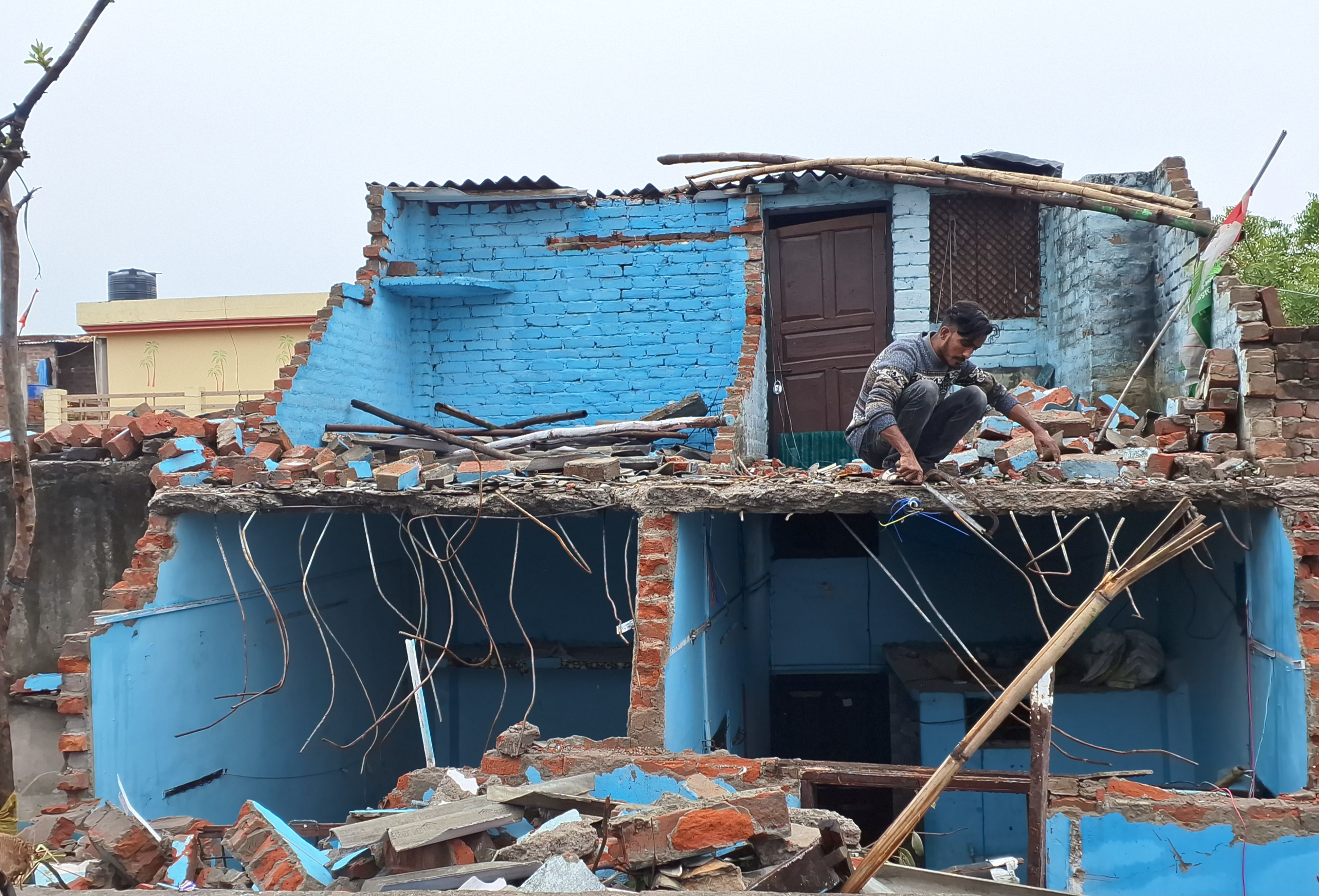
Reshma, who uses only her first name, said the authorities demolished her house despite the high court stay order. She said she had lived here for about 35 years. She first lived in a kuccha house with a thatched roof before slowly upgrading it over the years to a pucca structure.
Tapan Mishra, 42, pointed to a heap of rubble that used to be his home. “I was born here in 1982,” he said.
His 16-year-old son Saurabh missed his final exams due to the demolition. He had just returned home after appearing for the first paper of the examinations when his house was demolished. “... my books and notes were buried under the rubble,” Saurabh Mishra told Article 14.
Residents said most of the school-going children were unable to concentrate on their studies due to the fear of their houses being demolished.
Several families continued to live amid the rubble, with nowhere else to go, while a few moved in with relatives or secured houses on rent nearby.
First Homes Demolished
On 6 and 7 December 2023, state authorities razed 58 homes in Bhikampur, located just a kilometre from Akbar Nagar
Jitender Diwakar, a 35-year-old supervisor at the Lucknow Municipal Corporation, felt helpless as he watched government bulldozers demolish his three-storey house. He had received eviction notices from the LDA in October 2023.
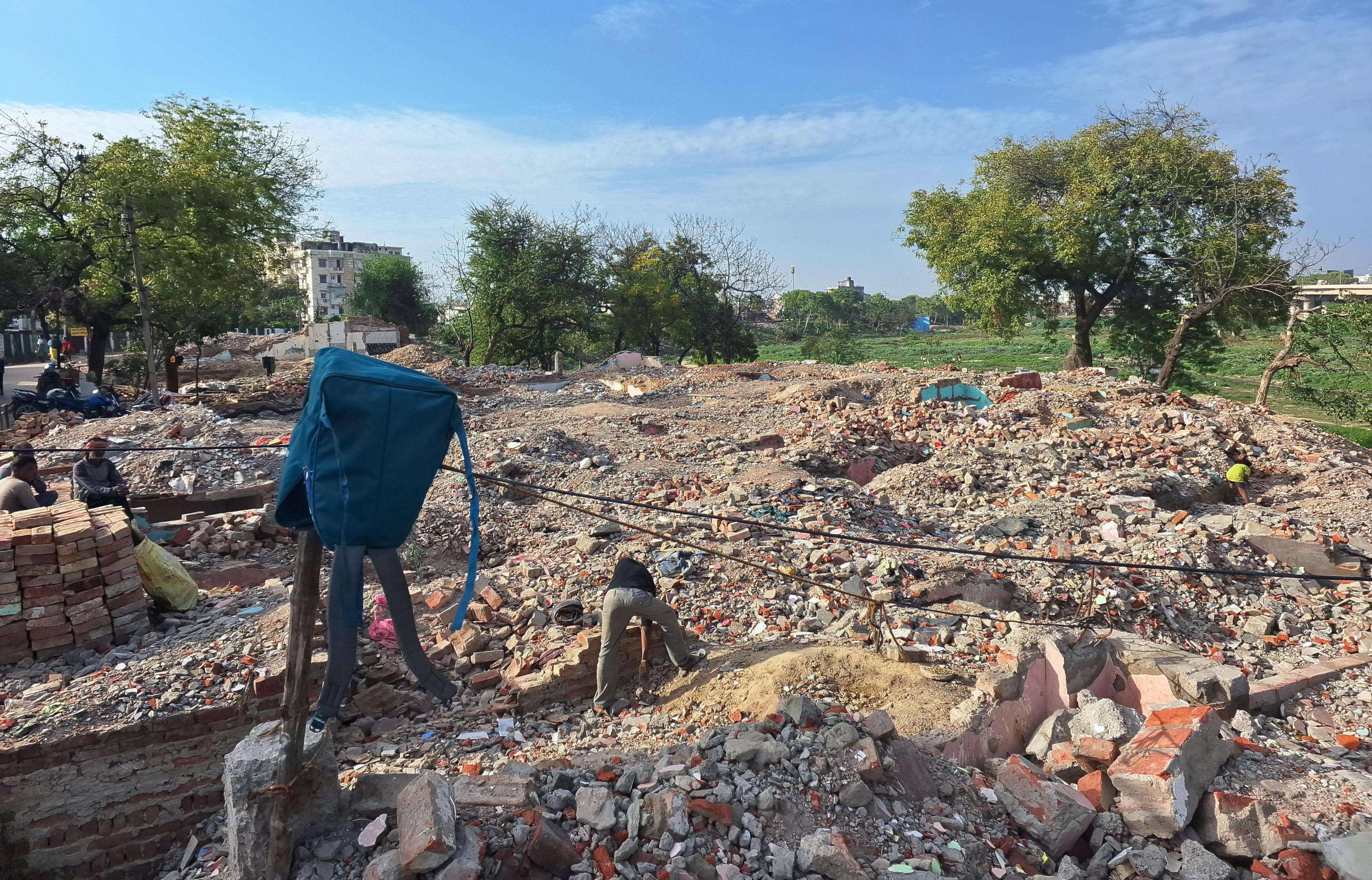
He had an appeal scheduled before the Lucknow divisional commissioner in two months—his hopes were dashed as his house was reduced to rubble.
Union defence minister Rajnath Singh, member of Parliament from Lucknow, had promised to intervene, Diwakar said, if the land was not under the revenue department or marked for beautification purposes.
“He didn't save it,” Diwakar told Article 14.
Diwakar's family of 10 had lived in Bhikampur for 50 years. They relocated to a tiny flat measuring about 270 square feet according to Diwakar, allotted by the LDA under the PM Awas Yojana.
The flat is located in Hari Nagar Colony, 15 kilometres outside the city. Diwakar will be required to pay approximately Rs 4,000 per month for a period of 10 years for the flat.
Paid Taxes For Municipal Services
Speaking to Article 14, high court advocate Jyoti Rajput, who represents some residents of Akbar Nagar, said the locality was named after Akbar Ali Khan, the governor of the state from 1972 to 1974 and responsible for several development projects in the area.
Rajput said the LDA could have issued the residents notices under relevant sections of the law if they had intended to peruse evidence of ownership. “... but they chose not to do so, because they didn’t want the residents to go to civil court to fight their case,” she said. According to Rajput, the LDA’s officials were aware that Akbar Nagar’s residents had lived on this land for a long time.
The LDA and the LMC have built, maintained, and repaired roads, and installed street lights, electricity lines, water lines, and other civic amenities as they have in other settlements of the city. Residents have been paying various municipal taxes—water charges, electricity bills and house tax.
On 16 August 1984, the LDA had written a letter to the then joint secretary of the Nazul department, informing that 283 people were residing on Nazul land in Akbar Nagar without paying any rent.
Due Process Not Followed
Residents of Akbar Nagar and Bhikampur received written show-cause notices from the LDA in August and September 2023 under section 27 (pertaining to demolition by the LDA of structures built without permission and/or in contravention of the masterplan) of the UP Urban Planning and Development Act, 1973.
The notices asked residents to respond within 15 days as to why their homes and shops should not be demolished. The notices said their structures were built without LDA approval, and were located in the flood zone of the Kukrail Nala.
In October 2023, about 1,000 residents submitted detailed replies opposing the show cause notices. They said every reply was rejected by the LDA, even though the residents were not given the opportunity to argue their case.
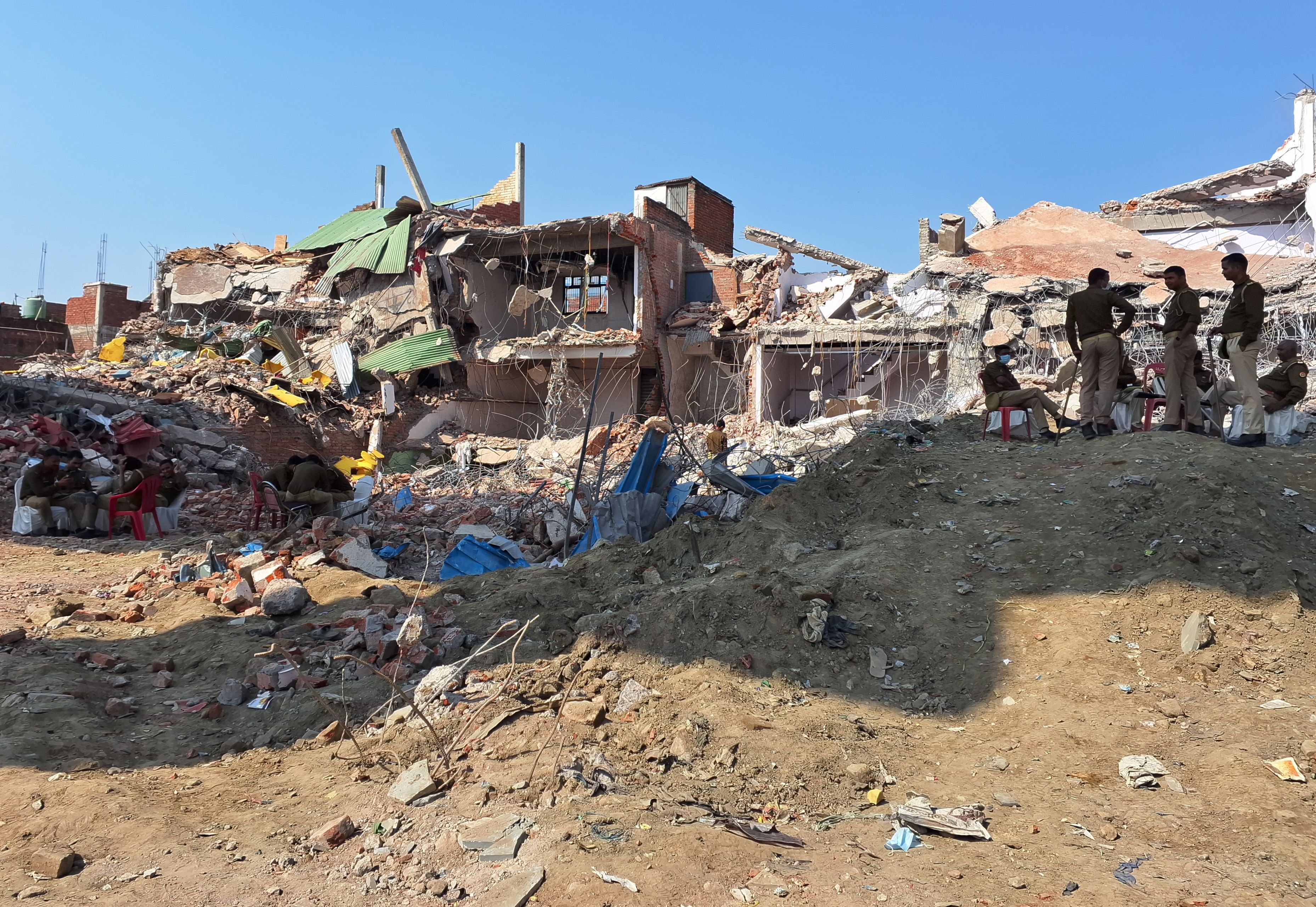
Demolition orders were issued in October 2023 against every home and shop in Akbar Nagar, 1,158 structures in all.
Senior advocate Ausaf Ahmad Khan, who represents around 400 families in Akbar Nagar, said that the LDA had issued notices to residents, alleging their homes were built in contravention of the master plan and zonal development plan, and were built without permissions.
He said the properties predate the UP Urban Planning And Development Act, and that approvals were not on plots measuring less than 800 square feet, which includes 85% of all plots in Akbar Nagar.
Distressed by the demolition orders, at least 250 residents of Akbar Nagar filed statutory appeals under section 27(2) of the law, and a first hearing in front of the chairman of the LDA was scheduled for 28 December 2023.
When 58 homes in Bhikampur were demolished on 6 and 7 December, news spread that similar action in Akbar Nagar was only a couple of days away.
Residents then approached the Lucknow bench of the Allahabad HC on 8 December.
Identical Orders, Appeals Dismissed
The same day, Justice Pankaj Bhatia directed Lucknow divisional commissioner and LDA chairman Roshan Jacob to hear and decide the matter, to condone delays in filing the appeals, and to refrain from continuing demolition work in Akbar Nagar while the appeals were pending.
According to residents' lawyers, the divisional commissioner dismissed approximately 250 appeals stating that they were baseless, on 15 December 2023.
“Divisional commissioner Jacob dismissed more than 250 appeals with a single identical order, without considering the facts and records,” said advocate Ausaf Ahmad Khan. The demolitions took place thereafter.
Advocate Amrit Khare, who represents around 100 individuals, said neither at the initial stage nor at the appellate stage did Jacob conduct the proceedings so that residents could be heard. He said many documents submitted by the LDA at both stages were not copied to the residents, but were relied upon while passing the demolition orders.
“Denying the opportunity of being heard, withholding the documents upon which decisions are based, and arbitrarily demolishing the property—these are cardinal sins in law,” he told Article 14. “Nobody should be condemned without being heard.”
Article 14 visited the LDA office in Gomti Nagar and met vice-chairman Indramani Tripathi. However, he refused to comment on the issue. Calls made to Jacob remained unanswered.
Article 14 approached Lucknow municipal commissioner Inderjit Singh, who was present during the demolition drive. He said, “You should go to the district administration office for the official version.”
Article 14 also visited the Lucknow district administration office in Qaiserbagh where collector Suryepal Gangwar was not available and did not respond to phone calls.
Pleas For Commercial Structures Dismissed
After the appeals were dismissed, on 21 December 2023, the authorities arrived with heavy machinery to demolish Akbar Nagar. Simultaneously, residents approached the Lucknow bench of the Allahabad HC once again, challenging divisional commissioner Jacob;s dismissal of their appeals.
Justice Pankaj Bhatia who heard the matter granted an interim stay on demolitions in Akbar Nagar for one month. The matter was slated for hearing once again on 22 January 2024.
Justice Bhatia noted that the residents had not been able to demonstrate titles in their favour, but had successfully established their possession, even though this possession was illegal.
On 23 January, the Chief Justice of the Allahabad HC transferred the matter from the single judge bench of Justice Bhatia to the division bench of Justice Vikram Chaudhary and Justice Om Prakash Shukla.
The division bench heard the residents of Akbar Nagar between 7 February and 26 February, and classified them into two categories: residential and commercial. The bench dismissed the petitions of 24 commercial and commercial-cum-residential owners. The order for residential petitions was reserved for 6 March.
The bench said petitioners occupying commercial structures had illegally built multi-storey furniture showrooms and workshops on large pieces of land belonging to the state government. They had been filing income tax returns and GST returns, and many lived in houses in different parts of Lucknow city and also owned other properties.
Deepak Chaurasia, 59, owned a steel wardrobe factory that had been operational for 40 years until it was demolished without allowing him to retrieve his goods. He said he was devastated because he was not the only one impacted by the demolition. “Ten men had been working in my factory to feed their families,” he told Article 14.
Mohammad Hameed, 38, a car mechanic, lost his spare parts shop and his source of income.
He said his was not among the 24 shops listed for demolition, but it was razed anyway. “If they had given some time to take things out, then a loss of lakhs of rupees would have been minimised,” said Hameed.
On 6 March 2024, proclaiming its final order on the residential petitions, the court upheld arguments presented by the LDA and issued an order for residents to vacate their homes by midnight of 31 March. Despite this court-ordered date, homes in Akbar Nagar including Reshma’s were razed in February.
‘I Have Decided To Boycott The Election’
When Rubeena Ali was two years old, her parents separated. Her mother brought her to Akbar Nagar where she grew up, going on to complete her college education at Lucknow University despite financial challenges.
“I now have a master's in social work,” the 43-year-old told Article 14. Her mother died two years ago.
After a long stint with a non-profit organisation, Ali started a chikan embroidery business, employing nearly 200 women from the Akbar Nagar community. The riverfront plaza project would not only snatch away these women’s homes but also their livelihoods, Ali said.
She said at election time, politicians from various political parties, including the Samajwadi Party, the Bahujan Samaj Party and the Congress, visit Akbar Nagar seeking votes.
“When our homes are being demolished and we are in trouble, no one stands with us,” said Ali. “So, I decided to boycott voting.”
Ali said she would not leave Akbar Nagar even if the government demolished her house and would live in the rubble. “My mother's memories are here.”
Suman Pandey, a 51-year-old last-mile health services provider called ASHA worker or accredited social health activist, resides with her brothers and a widowed sister-in-law in her maternal home in Akbar Nagar. She attended CM Adityanath's ‘Janata Darbar’ or public grievances meeting twice, but returned disappointed.
“I had heard that Yogi Maharaj listens to the people at the Janta Darbar,” she said.
The first time, she was unable to meet the chief minister. The second time, she attended the event in a group of five and met Adityanath’s assistant, who reportedly asked them whether they planned to fight the government.
“He said we would have to leave the house no matter what,” said Pandey. “I left the office in a rage.”
Gomti’s Contamination Not From Kukrail Alone
In court, the LDA submitted that Akbar Nagar threatens Lucknow's drinking water supply to a population of approximately 5 million residents. The LDA said the drains of Akbar Nagar discharge waste, including faecal matter, into the Kukrail Nala, contaminating the main water source.
The LDA emphasised on the fundamental right of the city’s residents to clean drinking water in arguing that it was necessary to remove 1,158 structures in Akbar Nagar.
The Kukrail Nala serves as a combined conduit, carrying domestic wastewater from localities such as Kalyanpur, Indira Nagar, Shakti Nagar, and Nishatganj in Lucknow, along with industrial effluents. Similar to Akbar Nagar, several densely populated residential areas such as Rahim Nagar, Abrar Nagar, and Khurram Nagar, also border this open drain.
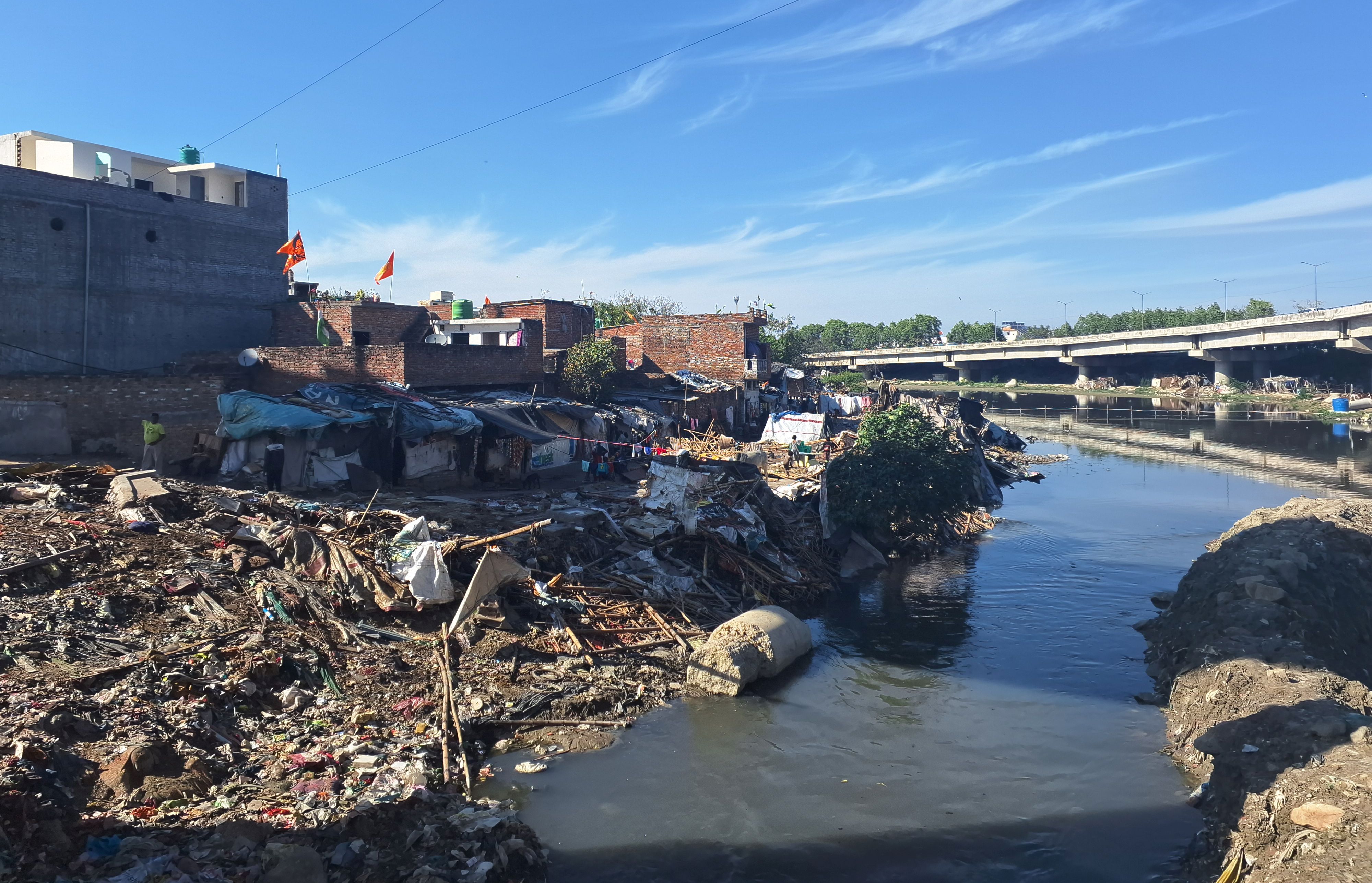
Imran Raja, one of the petitioners who approached the Supreme Court, said residents had asked the HC to appoint a body to conduct a survey, claiming that the majority of structures in these localities have septic tanks and do not discharge faecal waste into the drain.
“Has only Akbar Nagar contaminated Kukrail Nala and Gomti's waters?” Raja asked.
In September 2020, while hearing several matters, the National Green Tribunal directed states and union territories to establish functional effluent and sewage treatment plants and take remedial action to restore 351 polluted river stretches. The LDA also cited this order in court.
However, the LDA wants to remove the entire Akbar Nagar, which has around 1,200 homes and 100 shops. It is important to note that it was not developed in the previous four years but has existed for decades.
“The National Green Tribunal as far back as in the year 2020 found the existence of the Akbar Nagar slum as a serious ecological issue impacting the supply of clean drinking water to Lucknow city and had asked for its removal, which is pending even after four years till now. The matter requires urgent attention,” the high court said in its final order
Oustees Must Pay For Rehabilitation
In March 2024, residents filed three special leave petitions in the Supreme Court challenging the final judgement of the Allahabad HC.
On 22 March 2024, a bench of Justice Sanjiv Khanna and Dipankar Dutta directed the LDA to file an affidavit with supporting evidence including photographs and satellite images to show the catchment area, confirming that the riverlet in question is indeed perennial, rather than merely a city drain.
Lawyers for the residents cited, as evidence that the Kukrail Nala was not a perennial river, a detailed report submitted to the LDA in 2013 by experts from the Indian Institute of Technology (IIT)-Roorkee regarding the feasibility of a project to revamp the Gomti riverfront. This report referred to the Kukrail water body as a “nala” or drain throughout the document.
Meanwhile, the SC bench directed the petitioners to register for alternative accommodation under the scheme announced by the LDA.
Under the LDA’s scheme for relocation, residents may apply for a two-room flat of around 300 square feet at a cost of Rs 4.80 lakh, to be paid in monthly instalments of Rs 2,200 under the Pradhan Mantri Awas Yojana. The flats are located in Vasant Kunj on Hardoi Road in Lucknow, about 12 km from Akbar Nagar.
The court said the houses of those who applied for alternative housing by 31 March 2024 would not be demolished until the next date of hearing, 6 May.
Rubina Ali said that the LDA had not offered a rehabilitation policy. “The LDA is selling us their flats,” she said.
Over 10,000 residents of Akbar Nagar now look to the Supreme Court as their last hope, said Ali.
(Mohd Abuzar Choudhary is a Delhi-based independent journalist.)
Get exclusive access to new databases, expert analyses, weekly newsletters, book excerpts and new ideas on democracy, law and society in India. Subscribe to Article 14.

